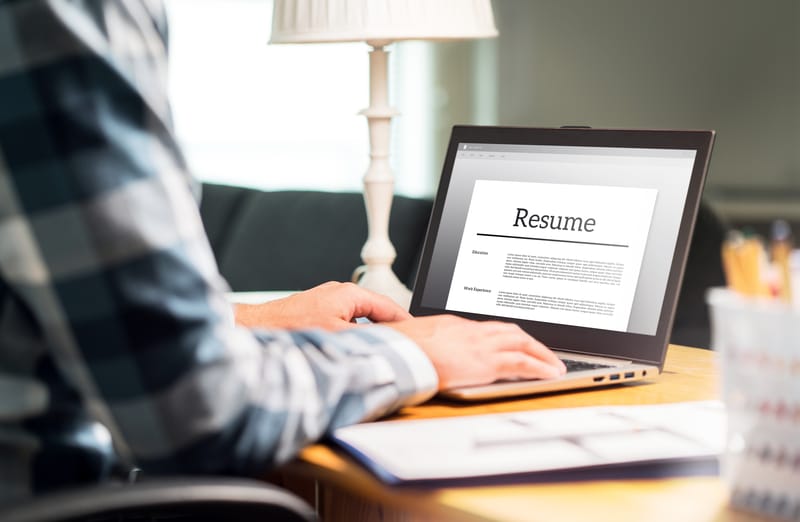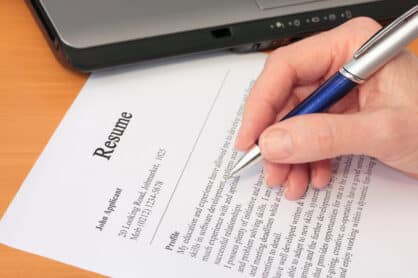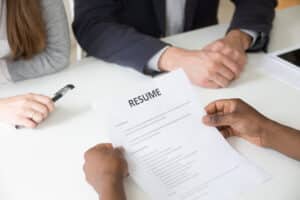Career Advice
This Article Talks About:
Home » Resume | CV Writing » How to Write a Good Resume
How to Write a Good Resume
https://www.whatjobs.com/info/resume-cv-writing-advice/how-to-write-a-good-resume

A well-written resume will get you an interview and a bad one will end up in the trash.
So knowing how to write a good resume is vital for any job seeker.
The perfect resume is a marketing tool for your own career progression and not just a professional summary statement or a generic reply to a job ad or job posting.
Your resume objective is to end the search and land an interview.
There are a number of things you can do to make that possible.
First, make sure you’ve got a strong cover letter – more advice on this can be found here.
Your resume layout needs to be done properly.
Any recruiter will just throw out confusing or badly written documents.
It’s vital it makes sense and any career experience is written in the past tense and information on your current role is in the present tense.
There are some essentials that you absolutely must include to get it right, particularly details of your past jobs and a skills section containing all the relevant information.
Below are some professional resume writing tips from WhatJobs’ career experts as to how to balance providing information to draw attention to your skill set so you can show you’re the right person for the job.
Make Sure The Basic Information Is Correct
If you’re looking for a career change or a new role, then you will be writing your resume as part of the job application.
Before you dive into the details, it’s a good idea to make sure the basic information and resume formatting is correct.
It’s vital for the recruiter and the interviewer to know your career path before they meet you, and you need to make that clear to them and make them want to invite you to be interviewed.
The first step is to ensure personal information and contact details are clear and obvious – they can’t ask you for an interview if you don’t put your phone number or email.
You’ll also need a resume education section with details of your university degree, professional experience, and references all need to be correct.
A resume summary statement at the top of the document could also be a good idea.
These are great to give a quick indication of who you are and what you’ve done straight away, which could catch the eye of a recruiter with little time and a lot of resumes to get through.
It can be three to five sentences or done in a bullet-point format.
The summaries can be very useful for very experienced candidates struggling to keep their resume to a reasonable word count.
READ MORE: How To Write A Cover Letter
What To Put In Your resume
As a rule, you work in reverse chronological order, with your most recent experience or qualifications listed first.
Using bullet points can be a good option if your resume starts getting a bit long.
Keep in mind, listing details of every single job you’ve had dating back to your teens probably isn’t necessary, but you need to give a clear indication of your work experience and your relevant skills.
A list of skills is just as important as your work history, particularly transferable skills for the role you’ve applied for.
Remember to mention “soft skills” too.
These include:
- Critical thinking
- Problem solving
- Public speaking
- Teamwork
- Leadership
“Hard skills” tend to mean specific knowledge of certain software platforms or any particular training you may have completed – employers tend to like it if you’re familiar with their tech.
Make sure you reference any certificates and qualifications you have and any courses you have completed.
Likewise, if you’ve ever won any company awards – for example, “employee of the month”, mentioning this gives your interviewer a good indication of how you could fit into the team.
Employers are very keen on good time management, so it’s important to make reference to that in your resume.
If you’re late to your interview, you’re facing a massive uphill struggle.
A good way to make yourself stand out for any job opportunities is to highlight any charity work you’ve done.
It’s a good idea to refer to your volunteer experience in your resume as it gives a good indication you have good social skills.
Employers often like the idea of staff having done volunteer work as it gives a good indication of what you’re like as a person and generally shows a good level of interest and energy about things outside the workplace.
Check, Check And Check Again
Creating a resume checklist could be useful to avoid any errors.
For example, a classic mistake is forgetting to put your personal email address and phone number.
After you’ve spent a good amount of time reading it, make sure you get someone else to look at your resume – a pair of fresh eyes can pick up things you might have missed.
And don’t forget to make it easy to read and check there aren’t any grammatical errors that might make you look careless.
You need to give it your best shot and you don’t want to miss out on your dream job because of a silly typo.
READ MORE: Looking for a new job? Find our free resume templates here
Different Types of Resume
An alternative to the traditional resume is to write a combination resume.
This combines the traditional chronological resume format with the more modern functional resume, which highlights your skills and relevant experience equally.
Some bigger recruiters use Applicant Tracking Software (ATS) to filter through applications.
This is software that scan applications for relevant keywords, so make sure you read up on the sort of terms you might need if you’re applying for a company that uses this software.
This is a technology that is able to filter the best applicants, so you really need to be on your game with regard to your resume.
More things to remember include making sure your resume is in a standard font and all in the same font size.
Some of the best fonts to use include: Arial, Arial Narrow, Calibri, Cambria, and Helvetica.
Also remember to highlight any career success, technical skills, and academic achievements.
Questions to ask yourself while writing your resume
Employers will want to learn what you did to benefit your last company.
To put it bluntly, they want to know how good you are at your job.
If you’re putting together your resume, you should think about what your new employer might want to know straight away.
Asking yourself questions is a great way to think about this.
READ MORE: How To Write A Great IT Resume
Here are some examples
- How many customers did I deal with on a daily basis?
- How much income did I generate?
- How did I contribute to the team and the office environment?
- What positive things did your former boss say about you?
- How did your presence improve the business?
Presentation is key
Remember, you are trying to create a great first impression and grab a potential employer’s attention with a brilliant resume showing off your know-how.
It’s not just about the previous experience shown in your resume, it’s also about how that information is presented.
You need to do all the work so the HR manager does not have to waste their time.
It’s your job to prove you’re a good fit for the company.
It’s best to assume the recruiter knows very little about your current role.
That means it’s your job to make them understand that by the time they’ve finished reading.
It goes without saying you need to include your contact info when applying for a new job.
However, there are also a number of things you should not put in your resume.
Although it’s great to use fancy fonts and formatting, bear in mind how many resumes your potential future employer has to look through.
Most people probably don’t have much time or patience.
This means if they have to search through your resume to find your key skills they are more likely to disregard it.
So make sure you tailor your resume to the job you’re applying for with all the necessary work history.
Another tip is using section titles and putting all the relevant work experience in chronological order.
READ MORE: 8 high-paying remote jobs you can get right now!
Use section headings
Using section headings is a great way to break up big chunks of text that could be difficult to read.
There are a number of online software tools you can use to help you craft your resume.
You don’t have to link to your social media profiles, but be aware your interviewer could look at them.
Some employers are particularly keen on a good LinkedIn profile.
If you are struggling there are plenty of online resume builder websites that can help you.
Websites also have a resume template you can use to create your own.
A lot of sites charge, but WhatJobs? Resume examples are completely free.
Keep it brief
Thomas Jefferson might not be the first person you think of when you’re putting your CV together, but remember this very simple, but very true quote.
“The most valuable of all talents is that of never using two words when one will do.”
In short, keep it brief.
Recruiters don’t have a lot of time, they just have too many applications to go through.
The hiring process is a lengthy one for them and they won’t give your resume the time of day if they think it’s poor.
So make sure your resume is as concise as possible.
Ideally, it should be one page long, at a push two pages, and must detail your skills and experience.
No recruiter is going to sit down and read a mini-pamphlet of your life and career.
Essentially it’s a step-by-step guide to you and your previous experience that should give the interview a good idea of your proficiency level.
As your career progresses you only need to summarize past jobs, just include a brief description of your role there.
It’s a balance though, as you don’t want to leave out information if it is relevant to the job, and you want to include your professional achievements.
The trick is to have all of the necessary information but in a concise resume format.
Make sure you understand the job role

Before applying for a job, read the job description thoroughly to make sure you understand what qualities are needed for the role.
Check your resume and make sure it highlights where your past experience matches what is needed for the job title.
You’ll need to show any experience you already have in this sector.
Applications like Grammarly and Microsoft’s own spellchecker are great to ensure there are no mistakes in your resume.
Making it clear you have a good idea of the job duties will give you a big advantage.
If a job description mentions that you will have to be trained and gain qualifications to do the role, put that you are ‘eager to learn and update your skillset.’
Remember that you need to be the piece that fits into the jigsaw with the other employees.
READ MORE: Tips for Job Seekers: How to Successfully Write a Resume and Pass an Interview
Consider things employers might like when writing your resume
Always think about what sets you apart from other applicants.
If your resume has a unique aspect which catches the eye of the interviewer, then what could give you the edge?
Employers could well be interested in:
- If you speak another language
- If you’ve achieved something incredible outside of work
- If you’ve achieved anything for outstanding work – awards, honors etc.
Writing resumes for different roles
More formal industries like law and politics will expect a simple, traditional resume.
Clean lines and simple colors are recommended for these resumes.
For more creative industries, for example, marketing, you can be a bit more elaborate with your resume design.
You can include brighter colors, different fonts and graphics to create a more eye-catching resume.
Update your Resume
It’s critical to keep your professional experience listed on your resume up to date.
If you take on a new project or get more experience in a different area make sure you add it to your job history so that potential employers can quickly see your experience and skill level.
Recruiters aren’t going to interview if you send them an out-of-date resume.
More about you
A good resume should always feature a little bit about you and what you like outside work.
A couple of sentences at the end of the resume detailing some of your interests is likely to go down well with your interviewer.
The CV Checklist
- Not too long (no more than two pages)
- Make sure contact information is there and correct
- Keep it updated
- Relevant job history
- Understand the job role
- Presentation is important
- But don’t try gimmicks to get noticed
- Make sure you mention the company name
- Write a strong cover letter
- Rewrite it for each specific job
- Check other examples of good resumes online















